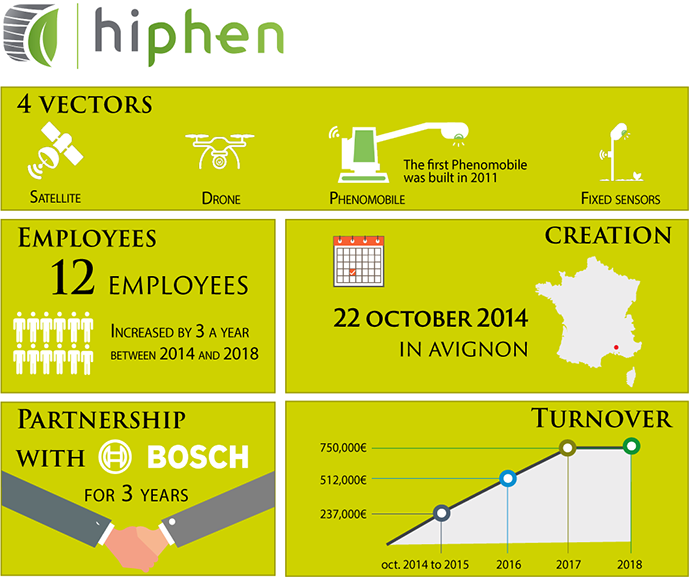Agroecology Reading time 2 min
3 questions for a start-up: Hiphen
Published on 18 February 2019
What does Hiphen do?
Alexis Comar: Phenotyping allows us to determine and list all the traits of plants. To achieve this, we measure them in a variety of ways using sensors such as the Airphen multispectral camera, or via satellite or drone. We also use the Phenomobile, an autonomous robot that can scan fields in order to test for a large number of crosses and thus accelerate varietal breeding. With our partner, Bosch, we also sell connected IoT Field Sensors. At a practical level, therefore, we can transform research into a consumable product. In the end, our selling point is that we are working on digitising the world of farming.
What are your links with INRA?
INRA seeks to add value to start-ups
Alexis Comar: Hiphen is a member of a scientific research programme focused on the application of remote sensing to phenotyping which involves INRA, Arvalis and our start-up. We work very closely with the Joint Technology Unit for Sensors and Remote Sensing to characterise the state and functioning of crops (UMT CAPTE). This unit is exceptional because it conducts both fundamental and highly practical research. Since it was set up in October 2014, our start-up has been based at the INRA centre in Avignon. The Institute implements a clear policy that seeks to add value to start-ups and foster their emergence. We benefit from considerable support from INRA, which is very positive and motivating.
Where are you going with Hiphen?
Alexis Comar: We are hoping to internationalise our services, specifically in Japan, China, Australia or even the USA. Furthermore, because of our R&D programme, we are continuing to develop artificial intelligence and the cloud, those magic words that dreams are made of! For the time being, we are using artificial intelligence for image processing and our algorithms are in the cloud, so that we can scale up under increasingly rapid, robust and reliable conditions.

Research by UMT CAPTE (Joint Technology Unit for Sensors and Remote Sensing) focuses on varietal breeding by means of high-throughput phenotyping, experiments on cropping systems and support with the crop management of farmed plots spread throughout a region. These remote sensing data are obtained using tools that can monitor crops in areas ranging from a micro-plot (approximately 10 m²) to a field (10 hectares). From data acquisition to their visualisation and automated processing, the aim is to improve crop efficiency. INRA (through its Joint Research Unit for the Mediterranean Environment and Modelling of Agro-hydrosystems, UMR EMMAH) and Arvalis are the principal actors in this Joint Technology Unit. An INRA unit in Toulouse is also involved, as well as Terres Inovia, the French Sugar Beet Research Institute (ITB) and the Association for Agricultural Technical Coordination (ACTA).
